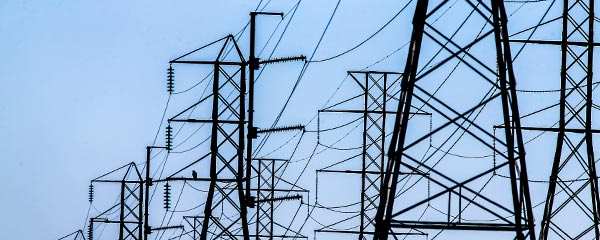PRINCETON, NJ -- Americans as a whole favor a wide-ranging set of proposals for dealing with the nation's energy and environment situations, but support varies markedly across party lines. Republicans are more likely than Democrats to favor opening up federal lands for drilling, and expanding the use of nuclear energy. Democrats are more likely to favor each of six different proposals, including emissions-control measures, spending government money on alternative sources of energy, and increasing enforcement of environmental regulations.
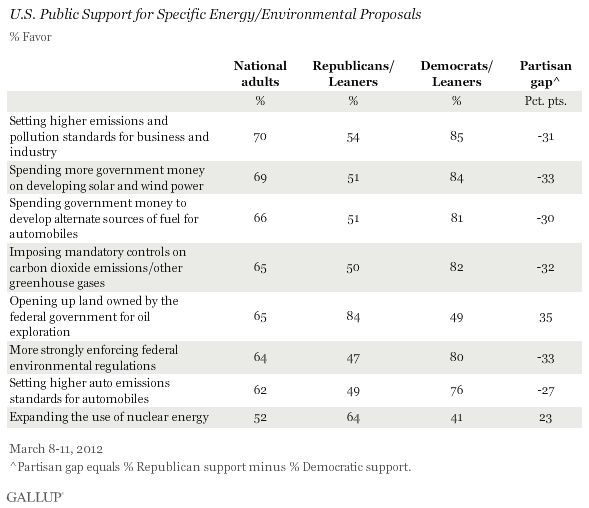
Gallup tested these eight proposals in its March 8-11, 2012, Environment poll. A major takeaway is that Americans generally appear to "want it all." At least a majority, and in many instances, significant majorities, of Americans say they favor each proposal. Support ranges from the 52% who favor increased use of nuclear energy to the 70% who favor setting higher emissions standards for business and industry.
Gallup finds sizable partisan gaps in support of the proposals, ranging between 23 and 35 percentage points. However, expanding the use of nuclear power is the only proposal that significantly less than half of either party group (in this case, Democrats) says it supports.
Support for Many Proposals Down Since 2007
Gallup has tracked seven of the eight proposals periodically since 2001. Support for all but nuclear energy has declined since last measured in 2007, with the largest drops seen for spending government money to develop alternative sources of fuel for automobiles, strengthening enforcement of environmental regulations, and setting higher auto emissions standards.
These declines could be due to Americans' reduced priority in the last several years for preserving the environment at the expense of economic growth, an outgrowth of the economic downturn. However, they are also likely to stem from heightened public concern about government spending and regulations specifically, particularly among Republicans.
For example, Democrats' support for spending government dollars to develop alternative fuel for automobiles remains above 80% in 2012, as it was in 2007. However, Republicans' support has fallen to 51% today from 84% in 2007, resulting in a 20-percentage-point overall drop in public support for the proposal over the same period.
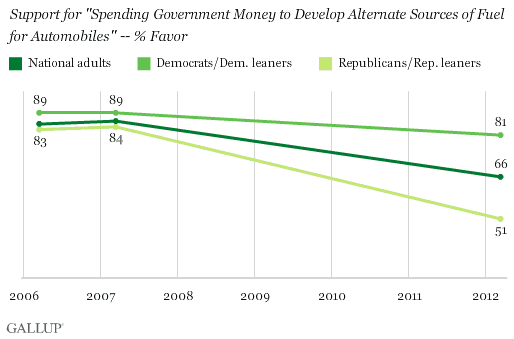
In similar fashion, Republicans have grown significantly less supportive of more strongly enforcing federal environmental regulations (47% today vs. 74% in 2007), while Democrats' support has fallen less sharply (80% today vs. 92% in 2007).
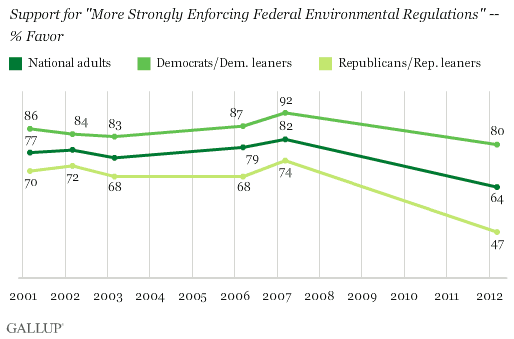
At the same time, partisan support for increased use of nuclear energy has not changed over the past five years, and the 52% of all national adults who favor it today is essentially the same as the 50% who favored it in 2007.
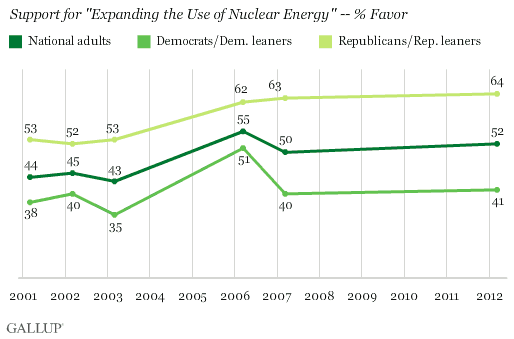
Bottom Line
President Obama recently said: "We've got to invest in a sustained, all-of-the-above strategy that develops every available source of energy." Americans as a whole do support increased drilling on federal lands and the development of alternative energy sources -- and a slight majority support increased use of nuclear power.
Americans also support a list of other proposals to help the environment, including higher emissions standards for business and industry, and more controls on carbon dioxide emissions.
But the economic problems of the last several years have had a modest impact on these attitudes, with support for most of the proposals down from 2007, when Gallup last measured them. And, Gallup trends show that, apart from attitudes about nuclear power, Republicans' and Democrats' views on these issues have grown more polarized over the past four years, mirroring the contentious nature of recent policy discussions in Washington over energy and the environment.
Survey Methods
Results for this Gallup poll are based on telephone interviews conducted March 8-11, 2012, with a random sample of 1,024 adults, aged 18 and older, living in all 50 U.S. states and the District of Columbia.
For results based on the total sample of national adults, one can say with 95% confidence that the maximum margin of sampling error is ±4 percentage points.
Interviews are conducted with respondents on landline telephones and cellular phones, with interviews conducted in Spanish for respondents who are primarily Spanish-speaking. Each sample includes a minimum quota of 400 cell phone respondents and 600 landline respondents per 1,000 national adults, with additional minimum quotas among landline respondents by region. Landline telephone numbers are chosen at random among listed telephone numbers. Cell phone numbers are selected using random-digit-dial methods. Landline respondents are chosen at random within each household on the basis of which member had the most recent birthday.
Samples are weighted by gender, age, race, Hispanic ethnicity, education, region, adults in the household, and phone status (cell phone only/landline only/both, cell phone mostly, and having an unlisted landline number). Demographic weighting targets are based on the March 2011 Current Population Survey figures for the aged 18 and older non-institutionalized population living in U.S. telephone households. All reported margins of sampling error include the computed design effects for weighting and sample design.
View methodology, full question results, and trend data.
In addition to sampling error, question wording and practical difficulties in conducting surveys can introduce error or bias into the findings of public opinion polls.
For more details on Gallup's polling methodology, visit www.gallup.com.
